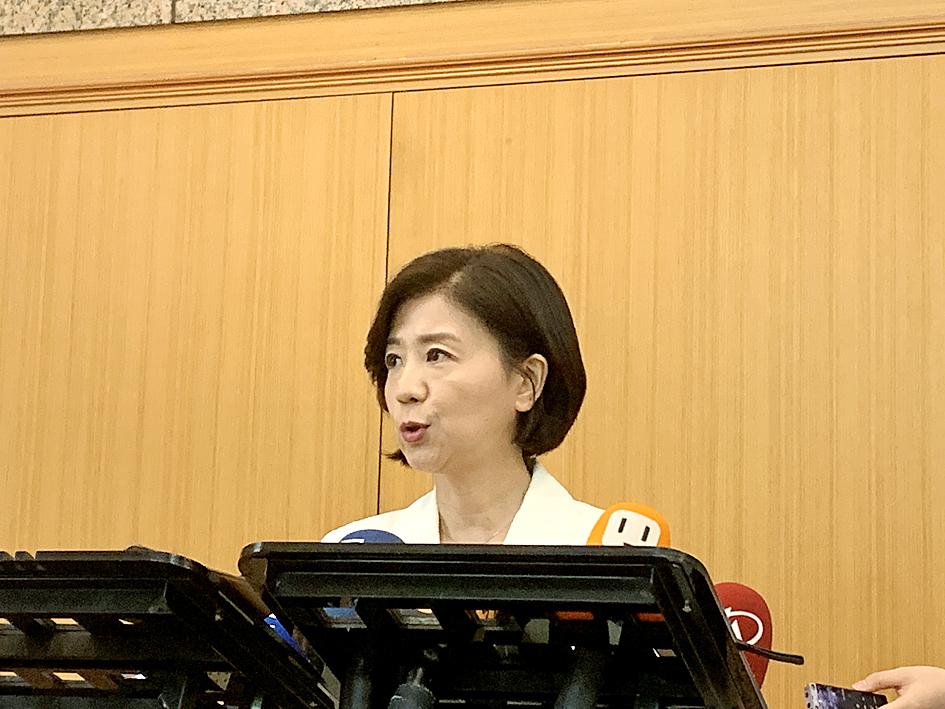Following its national congress on Sept. 6, the Chinese Nationalist Party (KMT) has begun preparations for the 2022 local elections.
The KMT is seeking re-election in New Taipei City, Taichung and Chiayi, as well as Hsinchu, Changhua, Yunlin, Yilan, Hualien, Taitung, Penghu and Kinmen counties, said a party source, who spoke on condition of anonymity.
The party would conduct early satisfaction surveys for the mayors and commissioners of those municipalities to see which regions need reinforcement, the source said on Sunday.

Photo: Chien Jung-fong, Taipei Times
The terms of office of the Lienchiang, Miaoli and Nantou county commissioners are to end in 2022, and it remains to be seen who would “take over,” the source said.
Among the eight municipalities that the KMT does not govern, the pan-blue camp has a “good chance” of winning in Taipei, Taoyuan, Keelung and Hsinchu, the source added.
However, due to its role as the nominating body, it would not be suitable for the KMT’s central body to decide who is to represent the party in the mayoral elections in those cities, they said, adding that the KMT would encourage party members to compete for the nomination and then select the best candidate based on poll results.
In Kaohsiung, where the KMT lost a mayoral by-election on Aug. 15, KMT Organizational Development Committee director Lee Che-hua (李哲華) has reportedly begun reassembling KMT city councilors.
Besides the resignation of the KMT’s Kaohsiung City Council caucus convener, several city councilors have also left an online chat group, Lee said on Sunday.
Now that he is committee director again, Lee said that he would hold a caucus meeting before the council opens next month and invite city councilors to a meal to elect a caucus convener, and confirm the candidates for the new head of the KMT’s Kaohsiung chapter.
The KMT is also expected to hold elections for party chairperson and party representatives, as well as for party Central Committee and Central Standing Committee members, next year.
The KMT’s 20th party representatives and chairperson elections were held in May 2017, but then-chairman-elect Wu Den-yih (吳敦義) did not take office until August, sparking criticism from within the party that the transition period was too long.
Then-outgoing KMT chairwoman Hung Hsiu-chu (洪秀柱) had planned to hand over the position to Wu in June, but Central Standing Committee members aligned with Wu raised legal doubts over a handover before a national congress was held, and insisted that Wu take office on the day of the congress.
If the KMT holds its national congress and chairperson inaugural ceremony in late August or early September next year, then voting for the party’s next chairperson and representatives could take place in early or mid-August, party sources said.

Alain Robert, known as the "French Spider-Man," praised Alex Honnold as exceptionally well-prepared after the US climber completed a free solo ascent of Taipei 101 yesterday. Robert said Honnold's ascent of the 508m-tall skyscraper in just more than one-and-a-half hours without using safety ropes or equipment was a remarkable achievement. "This is my life," he said in an interview conducted in French, adding that he liked the feeling of being "on the edge of danger." The 63-year-old Frenchman climbed Taipei 101 using ropes in December 2004, taking about four hours to reach the top. On a one-to-10 scale of difficulty, Robert said Taipei 101

Taiwanese and US defense groups are collaborating to introduce deployable, semi-autonomous manufacturing systems for drones and components in a boost to the nation’s supply chain resilience. Taiwan’s G-Tech Optroelectronics Corp subsidiary GTOC and the US’ Aerkomm Inc on Friday announced an agreement with fellow US-based Firestorm Lab to adopt the latter’s xCell, a technology featuring 3D printers fitted in 6.1m container units. The systems enable aerial platforms and parts to be produced in high volumes from dispersed nodes capable of rapid redeployment, to minimize the risk of enemy strikes and to meet field requirements, they said. Firestorm chief technology officer Ian Muceus said

MORE FALL: An investigation into one of Xi’s key cronies, part of a broader ‘anti-corruption’ drive, indicates that he might have a deep distrust in the military, an expert said China’s latest military purge underscores systemic risks in its shift from collective leadership to sole rule under Chinese President Xi Jinping (習近平), and could disrupt its chain of command and military capabilities, a national security official said yesterday. If decisionmaking within the Chinese Communist Party has become “irrational” under one-man rule, the Taiwan Strait and the regional situation must be approached with extreme caution, given unforeseen risks, they added. The anonymous official made the remarks as China’s Central Military Commission Vice Chairman Zhang Youxia (張又俠) and Joint Staff Department Chief of Staff Liu Zhenli (劉振立) were reportedly being investigated for suspected “serious

American climber Alex Honnold is to attempt a free climb of Taipei 101 today at 9am, with traffic closures around the skyscraper. To accommodate the climb attempt and filming, the Taipei Department of Transportation said traffic controls would be enforced around the Taipei 101 area. If weather conditions delay the climb, the restrictions would be pushed back to tomorrow. Traffic controls would be in place today from 7am to 11am around the Taipei 101 area, the department said. Songzhi Road would be fully closed in both directions between Songlian Road and Xinyi Road Sec 5, it said, adding that bidirectional traffic controls would